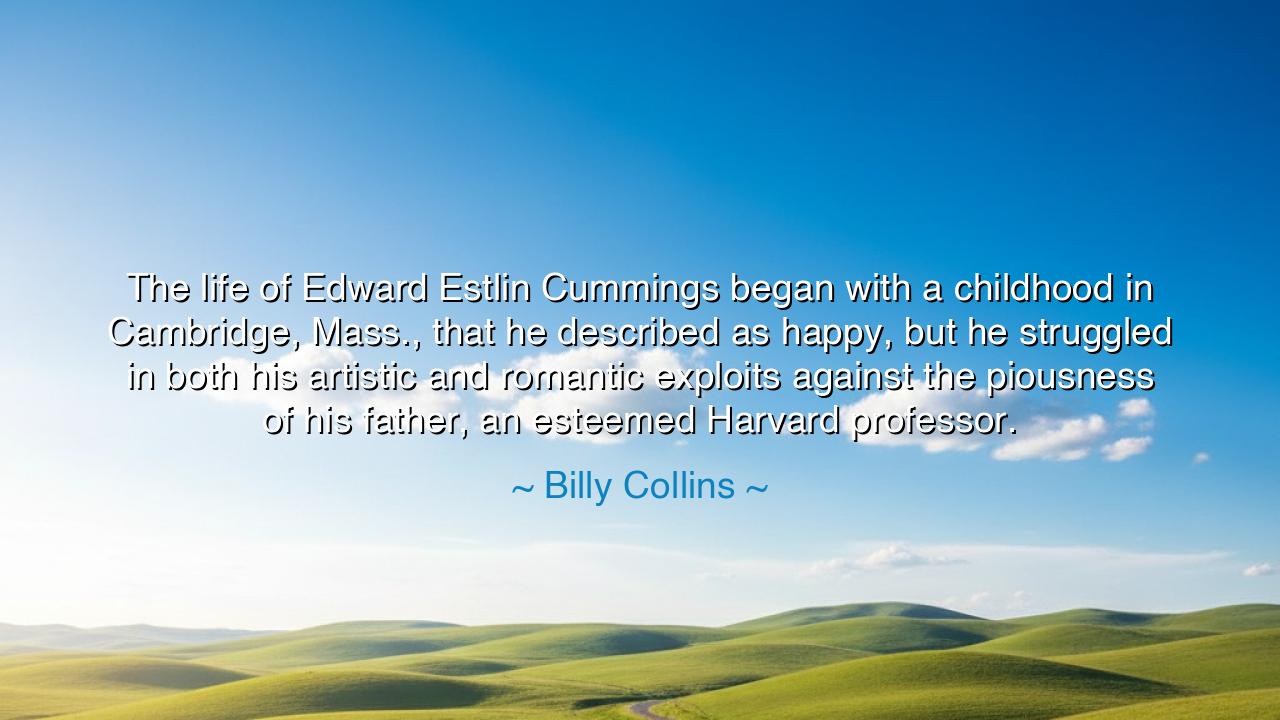
The life of Edward Estlin Cummings began with a childhood in
The life of Edward Estlin Cummings began with a childhood in Cambridge, Mass., that he described as happy, but he struggled in both his artistic and romantic exploits against the piousness of his father, an esteemed Harvard professor.






"The life of Edward Estlin Cummings began with a childhood in Cambridge, Mass., that he described as happy, but he struggled in both his artistic and romantic exploits against the piousness of his father, an esteemed Harvard professor." These words from Billy Collins capture the tension at the heart of E. E. Cummings’ life—a life shaped by both joy and struggle, by the quiet comforts of a privileged upbringing and the inward battle against a rigid, often pious environment. The young Cummings, though born into a happy childhood in the intellectual cradle of Cambridge, Massachusetts, was pulled in opposite directions by the forceful presence of his father, a man of stern moral convictions and Harvard prestige, and Cummings' own creative desires that sought to break free from conventional norms.
In the ancient world, this conflict between creative impulse and societal expectations was not unfamiliar. Sophocles, in his tragedies, depicted the struggle of individuals who sought to follow their own path, only to be thwarted by fate or the social order. Similarly, Socrates was a man who sought the truth, not through conformity, but through challenging the beliefs of his time. Just as Cummings found himself at odds with the pious expectations of his father, so did Socrates find himself at odds with the Athenian elite, whose established norms and ideals he questioned. In both cases, the artist and the philosopher were drawn toward a deeper, more authentic understanding of life, but they faced resistance from those who believed in maintaining the status quo.
For Cummings, this tension was deeply personal. His father, a respected Harvard professor, embodied the piety and conservatism that shaped much of Cummings' upbringing. The struggle that Collins speaks of was not simply an intellectual one but a battle of identity—a conflict between the free spirit that sought to explore the world through art and romance, and the structure and discipline of a father’s values. The young poet, much like the ancient artists and thinkers, longed to express his own vision of the world, one that was free from the constraints imposed by authority. Yet, the piety of his father loomed large, creating a world in which Cummings could not fully flourish unless he broke away from the very roots that had given him life.
Consider the example of the great Michelangelo, who faced similar struggles early in his life. Though born into a wealthy family, his father wanted him to pursue a traditional career, not the artistic path that Michelangelo would later become famous for. Michelangelo's conflict, like Cummings', was both external and internal—he sought to fulfill his own vision in a world that had its own plans for him. His artistic journey was a struggle against not just social norms, but against the very expectations of his family, much like Cummings, whose journey into poetry and love was not welcomed by the world his father had envisioned for him.
The lesson embedded in this struggle is clear: creativity and freedom of expression often come at a cost. For Cummings, that cost was the tension he felt between art and convention, between his personal desires and the expectations of others. Cummings’ poetry, which celebrated the individual and sought to break the rules of language and form, was a direct reflection of his desire to break free from the chains of social and familial constraint. His artistic freedom was earned through a willingness to challenge both the moral authority of his father and the broader societal norms that shaped him.
This conflict—between individual freedom and societal pressure—is not unique to Cummings, nor is it bound by time. Throughout history, artists, philosophers, and thinkers have fought this battle, for it is often the nature of society to impose its values upon the individual. Just as Cummings struggled to reconcile his own passions with his father’s pious expectations, so do we often struggle in our own lives to find balance between the world’s demands and our own desires. Whether it is family, work, or society, the external pressures we face can often overshadow our own inner calling.
The lesson here is one of courage and authenticity. Just as Cummings pursued his art despite the opposition of his father, we must find the strength to pursue our own truths—to live authentically, despite the forces that may seek to shape us according to their expectations. Creativity, whether in art, relationships, or personal growth, demands that we push against the boundaries of convention and be willing to risk rejection or misunderstanding for the sake of self-expression. This is the great lesson of Cummings, and of all those who have dared to follow their own path.
In our own lives, we must cultivate the ability to balance the demands of the world with our own vision for who we are. It may not be easy, and it may not be free of conflict, but like Cummings, we must understand that the pursuit of truth—our own truth—is worth the struggle. Whether it is through our work, our relationships, or our creative expressions, we must find the courage to follow the path that resonates with our deepest desires and passions. Like the great thinkers and artists before us, we must embrace our own vision, even if it stands in contrast to the expectations of the world around us. The struggles we face are not just obstacles—they are the very forces that shape us into the individuals we are meant to be.






AAdministratorAdministrator
Welcome, honored guests. Please leave a comment, we will respond soon